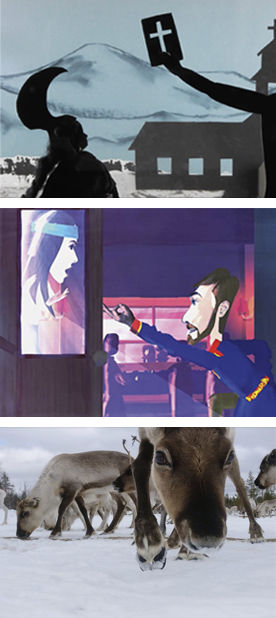Stretching across parts of Norway, Sweden, Finland, and Russia, Sápmi (Sámiland) was traditionally inhabited by the Sámi people. The Sámi’s polytheistic, semi-nomadic lifestyle has been marginalized by Scandinavians with discriminatory policies and forced assimilation. Three short films reflect on Sámi lifeways and efforts to reclaim their heritage and culture.
Rebel (Bihttoš)
Dir. Elle-Máijá Apiniskim Tailfeathers, 2014, 14 min.
Filmmaker Elle-Máijá Tailfeathers uses live-action re-enactments, archival photos, and animation to tell the story of her parent’s partnership. Although from different parts of the globe, Tailfeathers’ Sámi father and Blackfoot mother find love and understanding in their shared experiences as indigenous activists. A portrait of love and resistance, Rebel (Bihttoš) also documents the personal traumas that contributed to the relationship’s ultimate dissolution.
Wake Up Elena Wake Up (Morit Elena Morit)
Dir. Anders Sunna and Inga-Wiktoria Påve, 2017, 5 min.
This short animation acts as both a cautionary tale and a wake-up call. Following a young Sámi girl and her reindeer as they escape the threats of colonial oppression, Wake up Elena Wake Up (Morit Elena Morit) artistically entreats Sámi youth to evade the creeping influence of cultural annihilation, and to reconnect with nature and their traditions.
Eat, Sleep, Feed, Repeat (Borrat, Biebmat, Báibmat, Ballat)
Dir. Aslak Paltto, 2020, 4 min.
A Sámi herder struggles amid the Covid-19 pandemic and an extreme winter. This short film illustrates the herder’s daily routine of feeding, herding, and refueling in order to keep the reindeer alive until the snow melts.
Films to be followed by discussion with Tim Frandy, Assistant Professor of Folk Studies, Western Kentucky University.
Presented by Penn Museum and cosponsored by Penn's Cinema and Media Studies; Wolf Humanities Center; Natives at Penn; and Center for Experimental Ethnography.




